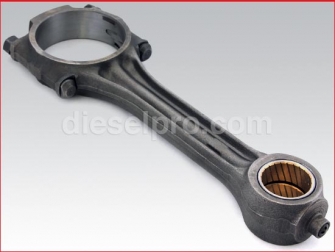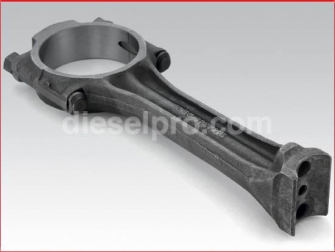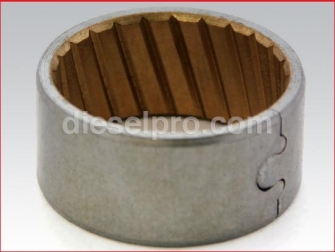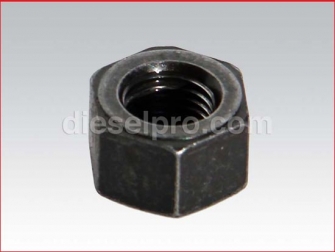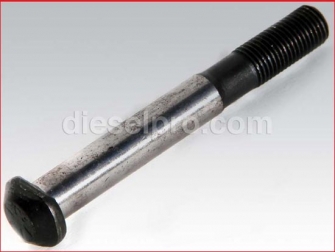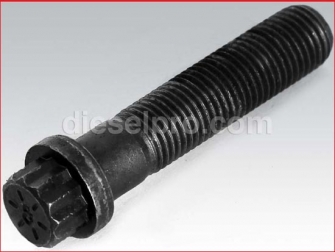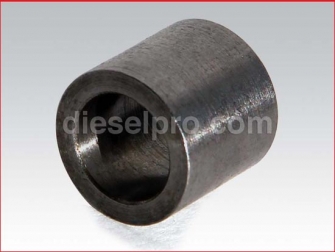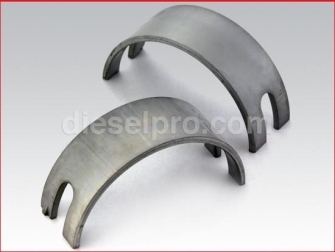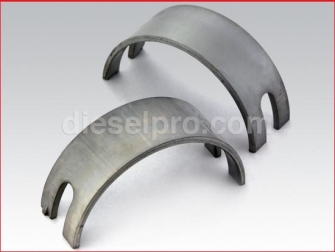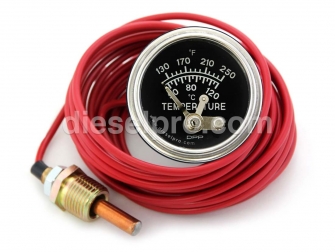Parts for Detroit Diesel 16V71 Non-Turbo - Connecting Rod Section
 Loading...
Loading... Parts for Detroit Diesel 16V71 Non-Turbo – Connecting Rod Section
The Detroit Diesel 16V71 Non-Turbo engine stands among the most powerful configurations of the iconic 71-series two-stroke family. This naturally aspirated 16-cylinder engine is used in a wide range of heavy-duty applications, from industrial and power generation to marine propulsion and large commercial vehicles. Each of its sixteen cylinders relies on a robust connecting rod assembly to convert the reciprocating motion of the piston into the rotary power that drives the crankshaft.
In high-output engines like the 16V71, connecting rods experience tremendous forces—compressive, tensile, and bending—during every revolution. Maintaining the correct geometry, balance, and bearing clearance in these rods is essential to preserving engine life and smooth operation. The following section explains each connecting-rod-related component available for the Detroit Diesel 16V71 Non-Turbo, emphasizing proper maintenance practices and replacement guidelines.
Connecting Rods for Detroit Diesel 16V71 Non-Turbo
Rebuilt Connecting Rod for 1-Piece Piston
This connecting rod is designed for engines configured with the original 1-piece piston design. It is rebuilt to OEM specifications using precision machining, re-bushed small ends, and reconditioned big ends to restore correct bore alignment and bearing fit.
-
Ideal for standard naturally aspirated 16V71 applications.
-
Sold with a refundable core deposit, ensuring the customer’s existing rod can be recycled.
-
Provides the correct balance and weight matching required for smooth V16 operation.
Rebuilt Connecting Rod for 2-Piece Piston
Some 16V71 engines utilize a 2-piece piston configuration, typically featuring an aluminum crown and steel skirt. The corresponding connecting rod differs slightly in geometry and balance.
-
Fully rebuilt and tested to factory tolerances.
-
Sold with a refundable core deposit.
-
Designed for 6V71, 8V71, 12V71, and 16V71 engines, but this section focuses on the 16V71 Non-Turbo variant.
-
Restores factory fit and performance when replacing worn or distorted rods caused by prolonged use or oil starvation.
When to Replace Connecting Rods
-
Visible scoring or discoloration at the big-end bore.
-
Elongated bushing or excessive play at the wrist pin end.
-
Cracks or pitting detected during magnetic particle inspection.
-
Uneven wear indicating oiling problems or crankshaft misalignment.
Connecting Rod Bushing
The connecting rod bushing ensures the wrist pin (also called the piston pin) can pivot smoothly with minimal friction. Over time, bushings can wear or ovalize, causing noise, vibration, and piston misalignment.
-
Material: Precision bronze alloy for high strength and oil retention.
-
Fitment: Detroit Diesel Series 71, including the 16V71 Non-Turbo.
-
Maintenance Tip: Always replace bushings when installing new pistons or rods to prevent premature wear on the wrist pin.
Connecting Rod Hardware
Connecting Rod Nut
These hardened steel nuts secure the connecting rod bolts, maintaining consistent clamping force under heavy loads.
-
Replace during any rebuild to ensure even torque retention.
-
Torque to manufacturer specifications using a calibrated wrench.
Connecting Rod Bolt
Connecting rod bolts experience repeated tensile loading during combustion cycles. Reusing old bolts can risk fatigue failure.
-
Always install new bolts during reassembly.
-
Available for both 1-piece and 2-piece piston configurations.
-
Manufactured from heat-treated alloy steel for durability.
Connecting Rod Spacer (2-Piece Piston)
This precision spacer aligns and supports the two-piece piston rod assembly, maintaining correct side clearance and axial balance.
-
Replace if signs of wear or deformation are visible.
-
Critical for maintaining uniform pressure on rod bearings.
Connecting Rod Bearing Shells
Bearing shells provide the smooth, replaceable interface between the connecting rod and crankshaft journal. The Detroit Diesel 16V71 Non-Turbo uses the same style bearings as other Series 71 engines, available in various undersizes to accommodate crankshaft refinishing.
Standard Bearings
-
For use when the crankshaft journal is at factory dimension.
-
Constructed with tri-metal alloy layers for superior fatigue resistance.
-
Designed for long service life under constant high-load operation.
Oversize Bearings (.010, .020, .030)
-
Designed for crankshafts that have been reground by 0.010”, 0.020”, or 0.030”.
-
Each shell set ensures proper oil clearance and film retention.
-
Provides consistent oil pressure and reduces risk of bearing knock.
Installation Notes:
-
Always match bearing size to the crankshaft journal finish.
-
Clean all mating surfaces thoroughly before installation.
-
Apply assembly lube during installation to prevent dry starts.
Importance of Correct Bearing Fitment
Proper bearing selection is crucial to ensure oil pressure stability and prevent crankshaft wear. Using an incorrect bearing thickness can result in low oil pressure, high friction, or premature failure. Mechanics often use Plastigage or micrometer measurements to confirm clearance within Detroit Diesel specifications.
Maintenance and Rebuild Practices
To extend the life of your 16V71 Non-Turbo engine’s connecting rod assembly:
-
Replace bolts and nuts with each overhaul.
-
Measure bearing clearances during assembly.
-
Ensure all rods are balanced within a few grams of each other to prevent vibration.
-
Inspect bushings for wear and replace if out of round.
-
Verify side clearances using feeler gauges after installation.
Performing these steps ensures reliable power delivery and protects the crankshaft from catastrophic damage.
Common Symptoms of Connecting Rod Problems in the 16V71 Non-Turbo
-
Knocking or thumping noises at idle or under load, often due to bearing wear.
-
Low oil pressure, indicating excessive bearing clearance.
-
Metallic particles in the oil filter, a sign of bearing or bushing failure.
-
Vibration or imbalance, often caused by a bent or mismatched connecting rod.
Ignoring these symptoms can lead to major internal engine damage. Early detection and component replacement prevent costly downtime and extend overall engine life.
Why Connecting Rod Rebuilding Matters
Rebuilding rather than replacing connecting rods is a cost-effective approach, especially for vintage Detroit Diesel engines like the 16V71 Non-Turbo. Reconditioning includes:
-
Resizing big-end and small-end bores to restore precise tolerances.
-
Replacing bronze bushings.
-
Polishing and balancing for uniform weight distribution.
-
Crack testing using magnetic particle inspection.
This ensures the connecting rod performs as new, preserving the integrity of the engine’s rotating assembly.
Why Buy Connecting Rods For The Detroit Diesel 16V71 From Diesel Pro Power
-
Over 40,000 satisfied customers worldwide.
-
Ready-to-ship inventory of genuine and rebuilt Detroit Diesel components.
-
Expert technical support with decades of experience in 2-stroke Detroit engines.
-
Fast global shipping and a user-friendly catalog for the 16V71 Non-Turbo and other Series 71 models.
When maintaining or rebuilding your Detroit Diesel 16V71 Non-Turbo, precision and reliability matter most. These connecting rod components deliver factory-grade performance, helping your engine continue running strong for thousands of hours in heavy-duty service.



 Free US Calls: 1-888-433-4735
Free US Calls: 1-888-433-4735 International: 305-545-5588
International: 305-545-5588






